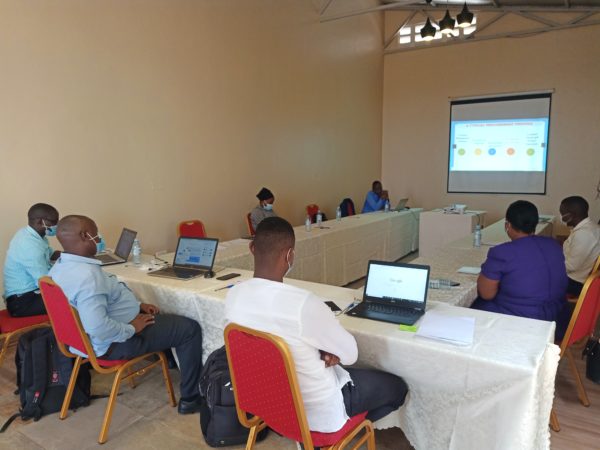
by Arthur Oyako
Four health workers, two from Kasangati Health Centre IV and two from Kira Health Centre IV have been trained on transparency, accountability, monitoring, and reporting of COVID-19 vaccine distribution campaigns.
The training, conducted by the Anti-Corruption Coalition Uganda (ACCU) was held on September 16, 2021 at Esella Country Resort in Kira, Uganda and was attended by ten participants—four health workers, four political leaders from Kasangati and Kira, and two ACCU employees—with two facilitators. It was conducted as part of the Uganda Vaccine Monitoring and Transparency Project, a project to increase transparency and accountability in COVID-19 vaccination campaigns, while promoting equitable distribution of doses and addressing sources of vaccine hesitancy in target communities. The project is implemented by ACCU, with funding and technical support from the Partnership for Transparency (PTF).
One component of the project involves consistent communication between ACCU and health workers at Kasangati and Kira. Thus far this communication has centered around weekly reports submitted by health workers to share information on the progress of and challenges to vaccination distribution in their communities. During the September 16 training for health workers, participants learned about the concepts of transparency in vaccine distribution in order to improve on the weekly reporting. The training will enable participants to include more targeted information with regard to deliveries, planned versus actual prioritization of doses, equity in vaccine distribution, reported side effects, and challenges faced in the distribution process.
The training emphasized that citizens have the right to access information on public health and allocation of public investments to allow for effective public oversight and accountability . Additionally, it was communicated to participants that accountability involved not only holding government responsible, but also holding citizens accountable to their communities. Citizens have not only rights, but responsibilities as well. With this in mind, there is a role for community members to play in order to adequately combat the pandemic, such as going to their local health centers to receive a vaccination.
Health workers participating in the training were also given information to enhance their understanding of the global vaccine market. Topics included the five critical procurement processes within Uganda’s contract management system: procurement planning, requirement specification, evaluation and selection, contract award, and project execution.
It was also revealed during the training that health workers at the lower level (health centres) only entered the process at the point of project execution. Otherwise, the national government of Uganda remains central to the usual procurement process.
At the conclusion of the training, participating health workers had gained a deeper understanding of the information needed to enhance their weekly reports and conduct more effective advocacy with duty bearers.
Arthur Oyako is the Communications Manager at the Anti-Corruption Coalition Uganda
To follow along with project developments, join the conversation on social media:
On Twitter: @PTFund / @Accu_Ug
On Facebook: Partnership for Transparency / Anti Corruption Coalition Uganda – ACCU
On LinkedIn: Partnership for Transparency

